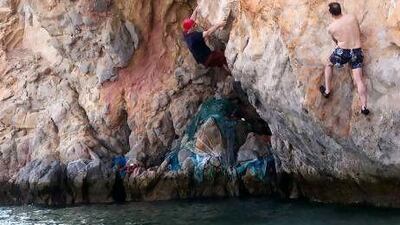RAS AL KHAIMAH // When Nicky Vanlommel returns to work after a weekend in the Ras Al Khaimah mountains, she needs to call the security guard.
Invariably, her fingertips have been so burnt from climbing on sizzling stone that the fingerprint scanner does not recognise her.
Nicky has it easy. Rock climbers tell of one RAK man who suffered third-degree burns when the black rubber of his climbing shoes melted and scalded his feet.
He was admitted to hospital and could not walk properly for months. Friends recall that he wore sandals for a year afterwards.
"It went right inside his flesh," says John Gregory, who has climbed these wadis since the 1980s. "He was out for six months."
So what brings these climbers back? "What else are we going to do?" asks John. "Go for brunch?"
He was a member of the first expedition to ascend Chile's 2,755-metre Fortress mountain in 1968, but these days he prefers a physical push at the other end of the thermostat extremes.
On weekend mornings, while the country sleeps, John gathers climbers in his kitchen for tea and toast before they go to wadi walls where the temperature nears 50°C.
For those living and working in Dubai and Abu Dhabi, the limestone wadis offer a relief from the urban swelter. And that's the appeal: it's all about the elements.
"It's so different to our city lives," says Blair Hoover, 31, an American climber who lives in Abu Dhabi. "You're not on the rock for most of the day, you're just outside and taking in nature."
Each cliff face has its own "personality" and, as with people, it changes with the weather.
"When you climb, you have a special relationship with your rock," says Nicky, a Belgian caver who started to climb last August. "You try to fit your body measurements to the rock measurements."
Blair nods. "Climbing on rock is a different puzzle," she says. "You put your blood on it.
"It's like you're having a dialogue with the rock: 'Can I put my hand here please?'"
Blair and her Canadian friend, Thoby Prinsep, started indoor climbing at a gym last year. Now, a six-hour round trip to drip sweat on stone has become a favourite way to spend the weekend.
When the climbers arrive at the site, the stone is still cool. Routes appear to them as they stare at the rock wall. They move with the shade as the wall becomes powdered with the chalk used to absorb the moisture of sweaty hands.
Much of the day is spent on the ground, belaying friends - anchoring the ropes that prevent them from falling - from the comfort of the shrinking shade.
The climbers insist that they are perfectly cool in wadi passes that form a "wind tunnel". It is more like a light breeze, cool only when compared with the scorching heat of the open desert.
For those accustomed to the city comforts of air-conditioned cars and offices, a slow day in the shade of a wadi still feels as if you are sweating from your fingernails.
"If you get out there early, you really sort of progress as the heat improves," says John.
Hot rock does not lend itself to climbing. "It's the exact opposite," says Dee McEnery, another RAK veteran. "To do a really hard route, like in England, you wait until it gets colder."
Cold rock has more friction. "If your hand is sweaty you can't stay on the rock," says John.
"For really hard bouldering problems you like to go out when it's cold as can be."
Summer climbers try to start before 7am and finish by noon - but John can be found in the wadis setting new routes until sundown.
"Over the years, you do hundreds," he says. "But that doesn't really count for too much, if you think of all the routes in England or anywhere else in Europe."
As the sport has grown since 2008, climbers have found creative ways to avoid sunburn. They go nocturnal at Hatta and aquatic in Dibba's fjords, where they scale sheer cliffs and drop into the sea.
But it is the company, as well as the climbing, that John and Dee enjoy. And they have certainly inspired others. "They are what everybody wants to become," says Nicky.
"I think of John as the father of climbing," says Blair. "I think a lot of people do. He knows the rock."

